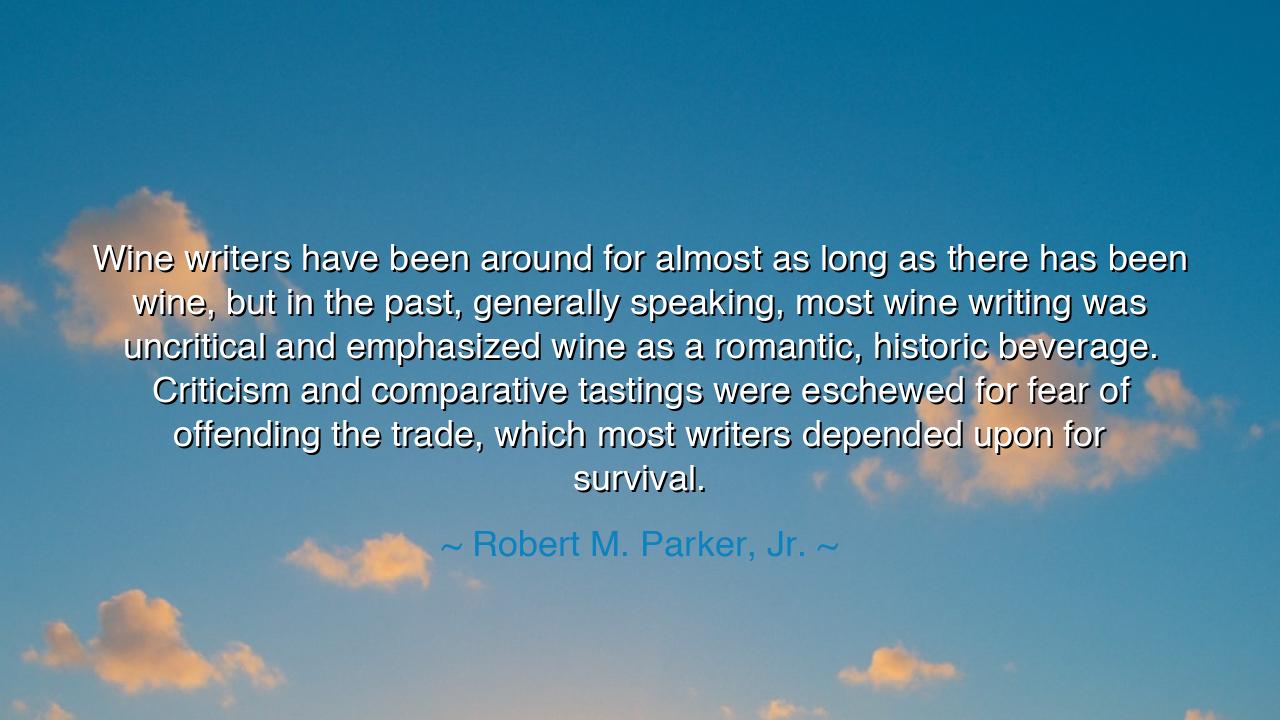
Wine writers have been around for almost as long as there has
Wine writers have been around for almost as long as there has been wine, but in the past, generally speaking, most wine writing was uncritical and emphasized wine as a romantic, historic beverage. Criticism and comparative tastings were eschewed for fear of offending the trade, which most writers depended upon for survival.






"Wine writers have been around for almost as long as there has been wine, but in the past, generally speaking, most wine writing was uncritical and emphasized wine as a romantic, historic beverage. Criticism and comparative tastings were eschewed for fear of offending the trade, which most writers depended upon for survival." These words from Robert M. Parker, Jr. illuminate a shift in the landscape of wine writing, where, for much of history, the craft was seen through the lens of reverence and idealism rather than critical analysis. For centuries, wine was regarded as a sacred elixir, entwined with the culture, history, and tradition of civilizations. From the ancient Greeks who raised their cups in honor of Dionysus, the god of wine, to the Romans whose banquets and feasts celebrated wine as a central element of their social and spiritual life, wine was more than a drink—it was a symbol of the divine, a connection between heaven and earth. In this world, wine writing reflected not the flaws but the romance and mystique of the beverage.
Indeed, the ancient world often saw wine as an emblem of culture, civilization, and even transcendence. Homer’s Odyssey is filled with references to the joys of wine, where it was more about the experience and the narrative of drinking than any objective comparison of its qualities. The Romans, in their abundance, passed wine around like a bond of shared humanity, and their philosophers often spoke of wine as a means of achieving wisdom or unlocking creative thought. But in these times, wine was often written about with a deep sense of reverence—to criticize or compare wines would be seen as an affront to their sacred nature. In the days of plato, it would have been unthinkable to subject wine to the scrutiny we now take for granted.
In the centuries that followed, the romanticism of wine writing persisted, and it was not until the more modern era that a shift began to occur. The emergence of criticism in wine writing, as Parker notes, was a disruption—a move away from the glorification of wine as a perfect, untouchable force to a more analytical approach. Just as the great philosophers of Athens dared to question the divine and the natural world, wine critics began to question the quality of wine itself. The fear of offending the trade, of angering the powerful merchants and producers whose livelihood depended on the sales of wine, kept many writers from adopting a critical approach. Much like Plato’s academy, where only the most refined minds were encouraged to ask bold questions, wine writing, too, became a space for those willing to challenge the status quo.
But what changed, as Parker suggests, was the rise of a more objective form of wine writing. With the democratization of wine criticism, where personal taste was no longer subordinate to the market forces, wine writers began to apply comparison and criticism—no longer accepting the glorification of every vintage simply because it came from a well-established vineyard. This shift was not just about challenging the tradition of wine writing, but also about giving consumers a voice. Much like the Renaissance thinkers who sought to empower individuals with the tools of knowledge and reason, these critics sought to open up the world of wine to the common person, allowing them to make informed choices beyond the influence of the elite.
Take, for example, the evolution of the wine market in the late 20th century. In the past, many of the finest wines were chosen not for their quality but for their heritage—their connection to tradition. Yet the rise of Parker’s 90-point rating system and the advent of comparative tastings broke open the notion that all wine was equally worthy of admiration. With critical assessment, wine began to be judged not just on its history or price, but on its actual merit—flavor, complexity, and balance. This change not only elevated the conversation about wine but also shifted how consumers viewed their own preferences, creating a more empowered and educated wine community.
Thus, the lesson here is not just about the critical nature of wine writing, but about the necessity of change and progress in all fields. Just as in the time of the ancient philosophers, when old paradigms gave way to new thinking, so too must we embrace the courage to question and analyze the traditions and ideas that have been handed down to us. The progress of wine criticism is a microcosm of larger societal shifts—a reminder that romanticism should not blind us to truth. Whether in art, science, or philosophy, criticism and analysis are vital for growth. They allow us to refine our understanding, hone our skills, and ultimately, move toward something better.
Let this serve as a reminder to all of us in our daily lives: we must not be afraid to question the established truths, whether in our work, our relationships, or our passions. Truth, however uncomfortable or unpopular, is a catalyst for growth. Just as wine, when tasted critically, reveals its true nature, so too does life reveal its richness when we dare to truly examine it. Let us, therefore, embrace both the romance and the critical lens—for it is in this balance that we find the true essence of understanding. Let us cultivate a spirit that is both appreciative and analytical, knowing that in doing so, we honor the wisdom of both the past and the future.






AAdministratorAdministrator
Welcome, honored guests. Please leave a comment, we will respond soon